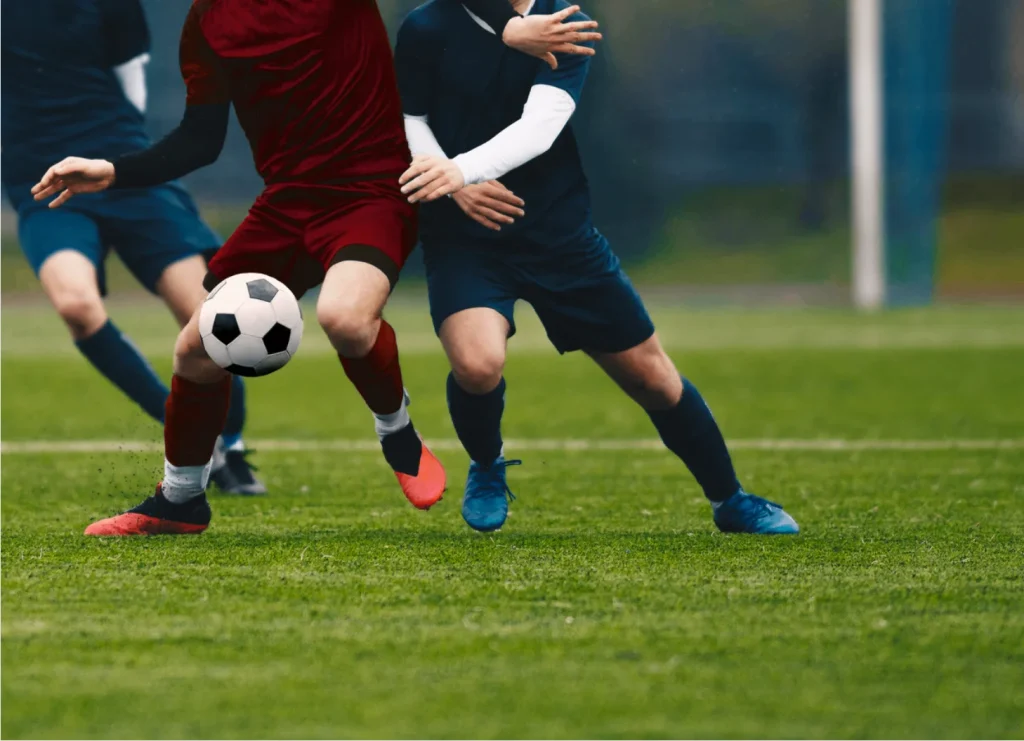
Football is one of the most physically demanding sports, and wearing the right socks can make a big difference in both comfort and performance. High-quality football socks are designed to offer comfort, support, and protection so players can stay focused on the match instead of being distracted by discomfort or injuries. Whether you’re playing competitively or casually, the socks you choose affect your speed, stability, and endurance. This article covers the key features, types, and benefits of the best football socks and highlights specific options, such as waterproof, durable, and blister-prevention designs, to help you make the right choice.
Durable Football Socks for Game Day
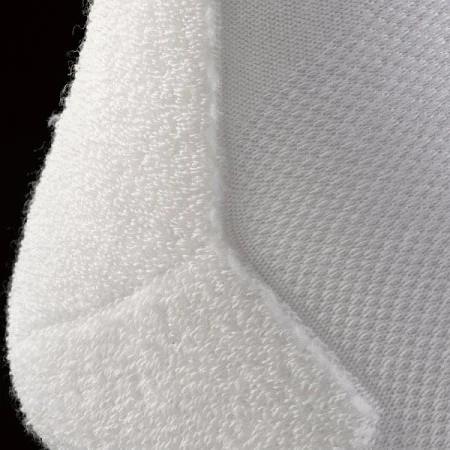
When selecting football socks, focus on the right combination of material, fit, and functionality. The right features not only improve comfort but also support performance across long matches.
Material and Comfort
Most premium socks use a blend of polyester, nylon, and spandex. These materials provide flexibility, breathability, and moisture control. Without them, socks may trap sweat, leading to blisters, odor, and discomfort. A proper fit keeps socks in place without cutting off circulation.
Support and Compression
Compression zones around the calf and ankle improve circulation, reduce swelling, and support muscles during sprints or quick changes of direction. This helps prevent fatigue and lowers injury risk.
Breathability and Moisture Control
Moisture-wicking fabrics pull sweat away from the skin, while mesh panels improve airflow. This keeps feet dry and cool, which is vital for both comfort and hygiene.
Football Socks Types (Explained)
Football socks come in a variety of types, each designed to address specific needs. Choosing the right type of football sock depends on the player’s personal preferences, playing style, and the demands of the game. Let’s break it down.
Grip Socks
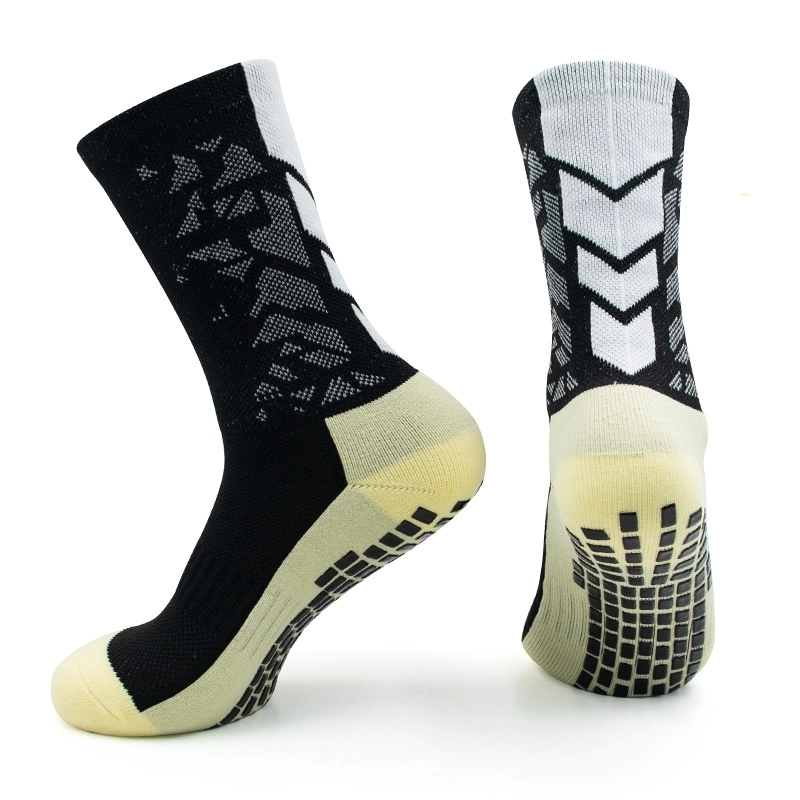
Grip socks are becoming increasingly popular among football players. These socks are designed with rubberized grip zones that improve traction inside shoes, preventing slipping and ensuring better stability during play. Grip socks are particularly beneficial for players who rely on quick changes of direction and need enhanced footing on slick or artificial turf. Players in fast-paced positions, like wingers or strikers, can benefit significantly from the added grip, helping them maintain balance during sudden movements.
Compression & Fit
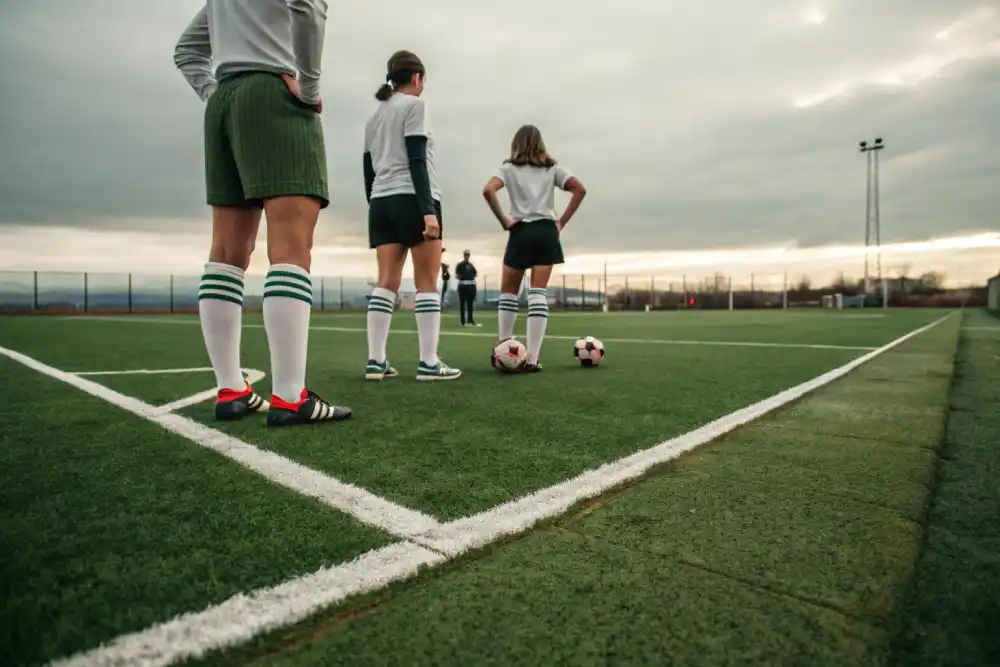
Compression socks are engineered to provide added support to the muscles and joints. These socks help reduce muscle fatigue, improve blood flow, and support the recovery process after intense play. Compression socks can also help prevent swelling in the lower legs and feet, reducing the risk of injuries and speeding up recovery. They are particularly useful for players involved in endurance positions like midfielders, where stamina is key.
Football Padded Socks: Cushioning Where It Counts
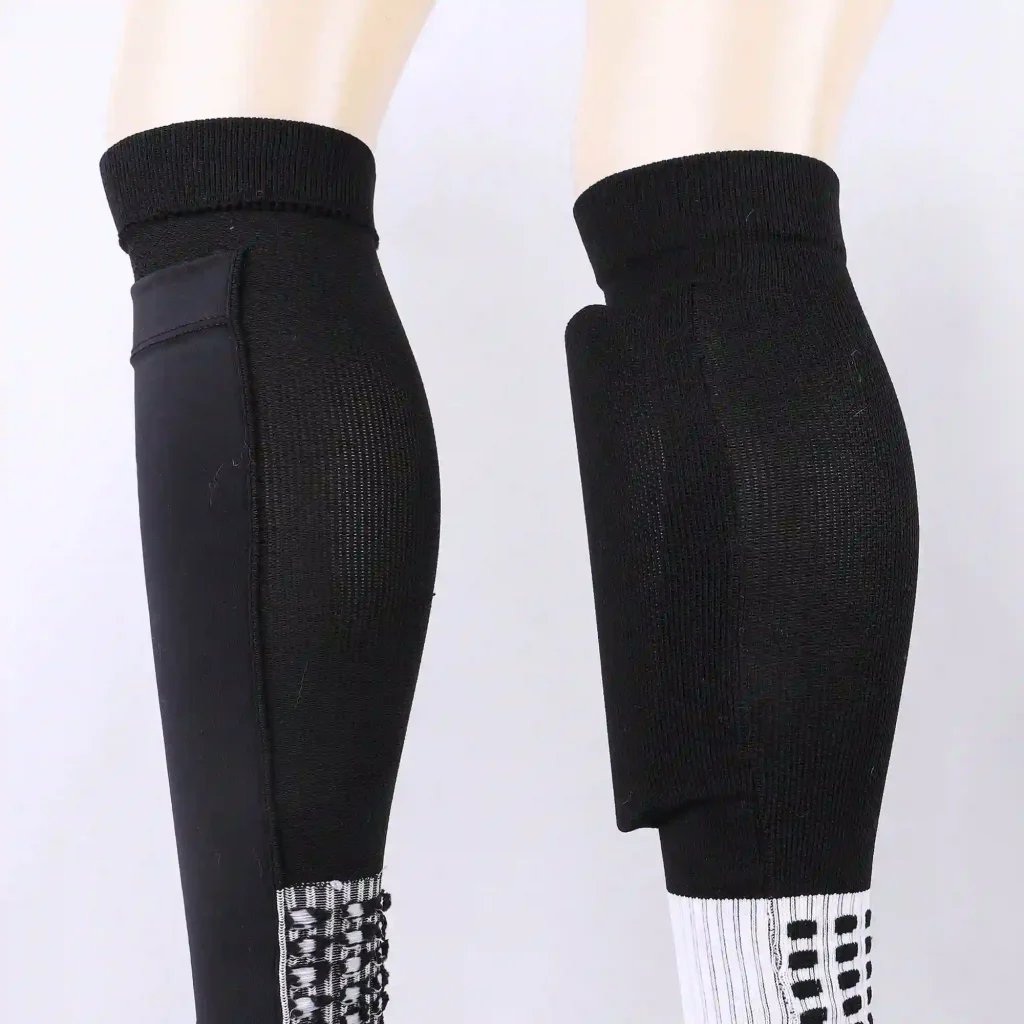
Padded socks feature extra cushioning in areas that endure the most pressure, like the heel and ball of the foot. Padded socks are ideal for players who engage in heavy tackles, frequent sprints, or long-duration matches. These socks offer additional protection to minimize the risk of impact injuries, such as bruises or blisters. Padded socks also help with comfort by providing extra shock absorption, which is especially helpful for players on hard surfaces or artificial turf.
Specialized Types of Football Socks
Waterproof Football Socks: When the Pitch Is Soaked
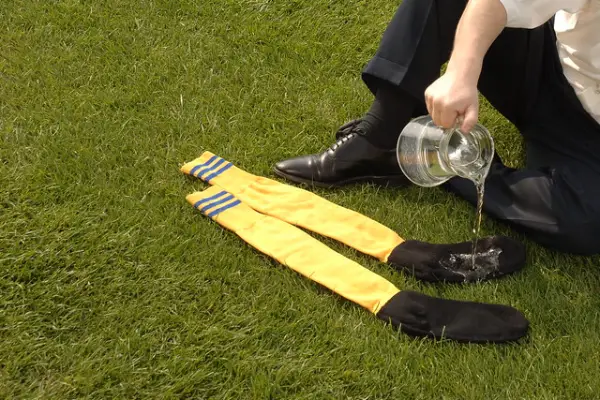
Rain, mud, and wet turf can cause discomfort and even affect safety. Waterproof football socks feature water-resistant membranes that keep feet dry without trapping heat. Many also include reinforced grip to reduce slipping inside wet boots. They are especially useful for teams playing in regions with frequent rain or during tournaments held in unpredictable weather.
Comfortable Sports Socks for Long Matches
Football socks must withstand constant running, tackles, and friction. Durable designs use reinforced yarns and high-stress zone padding around the heel, toe, and sole. A well-constructed pair maintains elasticity even after repeated washes and offers consistent performance across an entire season. For clubs that want longevity and reduced replacement costs, durability should be a top priority.
Best Football Socks to Prevent Blisters
Blisters remain one of the most common problems for players. Socks that combine snug fit, moisture-wicking fibers, and targeted cushioning help reduce friction. Some brands add a double-layer construction that prevents skin-to-sock rubbing. For athletes who play long matches or train daily, blister-prevention socks are a smart investment.
Football Socks for Youth and Men
Sizing matters. Youth players often need socks with extra stretch to fit growing feet, while men may require wide-fit designs for larger calves. Manufacturers now offer extended size ranges to ensure every player—from young academy trainees to adult professionals—can find a pair that fits securely. Proper sizing reduces distractions, keeps socks in place, and lowers the risk of chafing.
What Socks Do Football Players Wear?
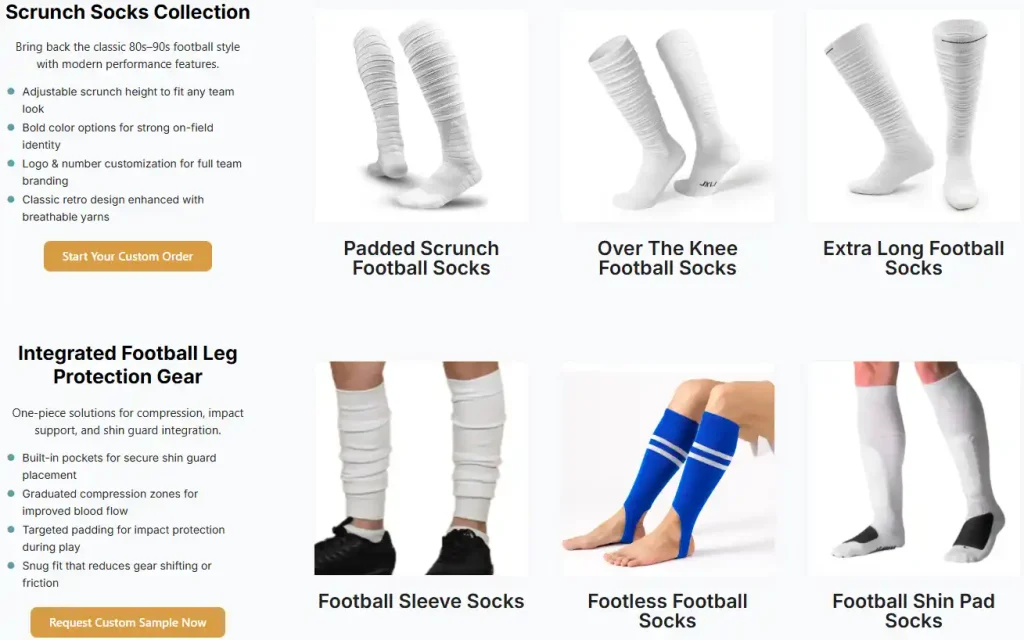
Most football players wear moisture-wicking, compression-based socks designed to support long-term performance. Professionals often choose grip socks for added stability inside their boots. Defensive players may prefer padded options for extra protection, while midfielders benefit from compression to handle heavy running. In wet conditions, waterproof socks are increasingly popular. The choice depends on playing style, field conditions, and comfort preference.
Grip vs Compression vs Padded vs Waterproof (Quick Compare)
| Type | Best for | Key benefits | Consider if… | Not ideal for |
|---|---|---|---|---|
| Grip | Fast cuts, artificial turf | Inside-boot traction, stability | You slip in your boots | Very loose boots (fix fit first) |
| Compression (15–20 mmHg) | Endurance, recovery | Reduced fatigue, stay-up cuff | Calf soreness late in matches | If you need medical-grade compression |
| Padded | Hard surfaces, heavy tackles | Impact absorption at heel/forefoot | You get bruised soles | You slip into your boots |
| Waterproof | Rain/mud, winter | Dry feet, wind block | Over-padding that dulls the ball feel | Hot climates or dry days |
Caring for Football Socks
Even the best socks wear out if not maintained. Wash in cold water, avoid fabric softeners, and air dry to protect elasticity. Rotate between pairs to reduce wear and tear. With proper care, football socks can last a full season while maintaining fit and performance.
Leading Brands Offering the Best Football Socks
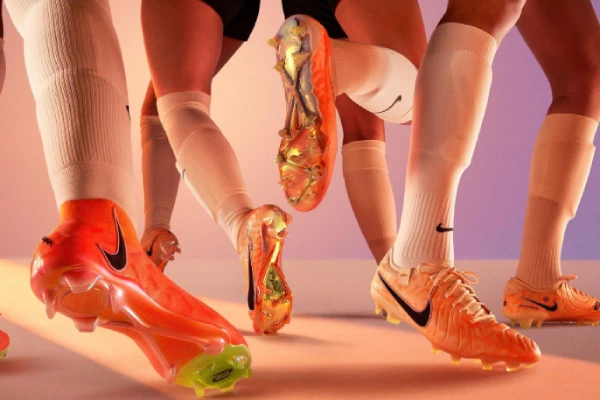
Several brands stand out in the football sock market due to their quality, innovation, and commitment to performance. Let’s take a look at some of the best brands known for their high-performance football socks.
Nike: Nike is a leader in the football sock market, offering products with advanced moisture-wicking technology and comfortable fits. What makes them so popular? Their Dri-FIT technology ensures that feet stay dry and cool, even during the most intense games.
Under Armour: Under Armour is another top brand known for creating durable and high-performance football socks. Their HeatGear fabric helps wick moisture away while keeping feet cool and dry. Their socks are perfect for athletes who need reliable performance throughout the game.
Adidas: Adidas combines comfort, style, and performance in its football socks. Their Climacool technology helps regulate temperature and moisture, keeping feet dry while providing extra support and cushioning for comfort during play.
FAQs
Are they durable football socks for game day?
Yes—look for reinforced heel/toe, abrasion-resistant yarns, and a wide stay-up cuff. Subtle underfoot grip helps, but durability mainly comes from high-tenacity fibers and mapped padding.
What socks do football players wear?
Most pros wear thin grip socks inside the boot, plus a calf sleeve (team sock top) over shin guards. Some choose light compression for stay-up and recovery.
Do football players wear compression socks?
Many do. 15–20 mmHg is common for sport; it helps with calf stability and reduces late-game fatigue.
Are football socks compression socks?
Not always. Some are standard OTC socks; others integrate mild compression. Check the stated mmHg or fabric claims.
What are football socks made of?
Primarily polyester/nylon blends with elastane for stretch. Cotton is comfy but retains moisture—use sparingly for match play.
Football socks without feet / with feet—what are they?
Calf sleeves. Players pair footed grip socks in the boot with a sleeve in team colors over the shin guard.
Best socks for football cleats?
A thin, snug grip sock that locks the heel and midfoot, with flat toe seams and targeted padding only at heel/forefoot.
Where can I buy adjustable football socks for a better fit?
True “adjustable” models are rare. Look for wide-calf variants, graded compression (15–20 mmHg), and cuff designs that resist slippage. If you need independent foot and calf control, use grip socks + calf sleeve.
Football socks called?
The standard match cut is OTC (over-the-calf). Footless versions are calf sleeves.
Conclusion
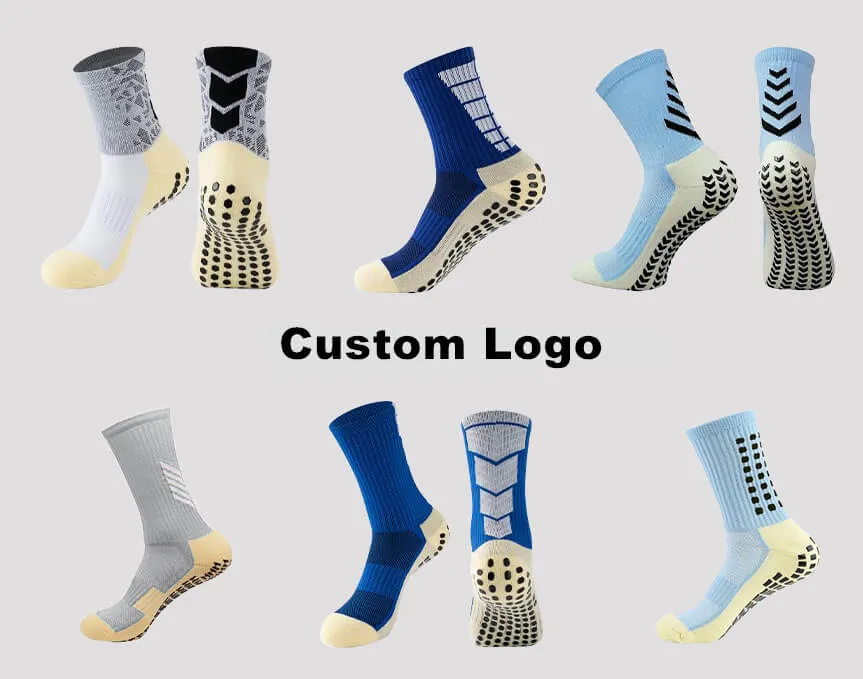
Choosing the best football socks is essential for ensuring comfort, performance, and injury prevention. By understanding the key features, types, and benefits of football socks, you can select the best options for your needs. Make sure to choose socks that offer the right fit, material, compression, and breathability to keep your feet comfortable and supported throughout the game.
Ready to elevate your game? Browse through our collection of high-quality football socks and find the perfect pair that suits your playing style. Whether you’re looking for grip socks, compression socks, or padded options, we have the perfect solution for you.
For clubs, teams, or retailers seeking customized designs or bulk orders, partner with Max Hosiery—a trusted manufacturer delivering durable, performance-driven football socks at scale. If you’d like to receive a sample, simply fill out the application form at the bottom or on the right side of this page, and our team will get back to you promptly.
